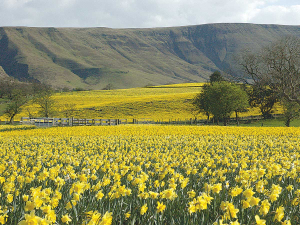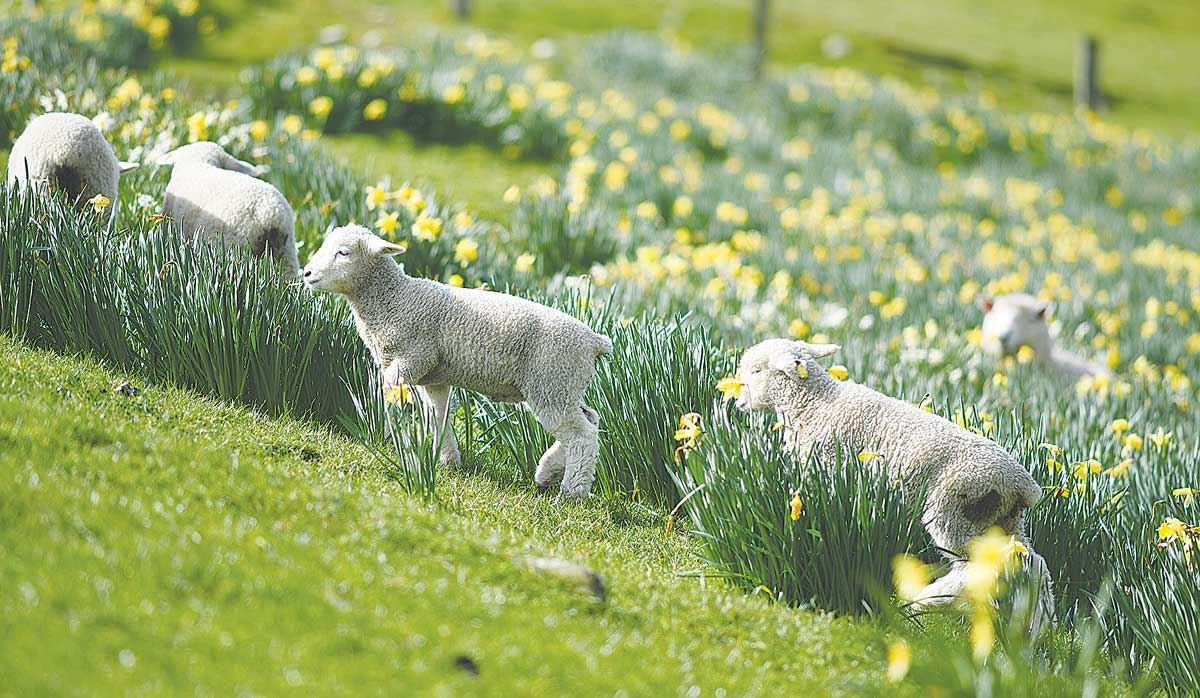Alliance commissions major heat pump system at Mataura, cutting coal use and emissions
Alliance Group has commissioned a new heat pump system at its Mataura processing plant in Southland.
 Agroceutical Products is known for its groundbreaking work extracting naturally occurring compounds from daffodils grown in Welsh mountains.
Agroceutical Products is known for its groundbreaking work extracting naturally occurring compounds from daffodils grown in Welsh mountains.
An extract from the humble daffodil will be put to the test in New Zealand after UK research discovered its potential to cut methane emissions from livestock.
AgriZeroNZ is partnering with Welsh research company Agroceutical Products, which discovered a naturally occurring compound from daffodils, haemanthamine, may be effective in reducing methane production in cattle after conducting lab trials.
The public-private joint venture (JV) is investing up to $4 million to trial the botanical methane-blocker on animals in New Zealand and, if successful, accelerate its development as a new emissions-cutting tool for Kiwi farmers.
Agroceutical Products is known for its groundbreaking work extracting naturally occurring compounds from daffodils grown in Welsh mountains, most notably galanthamine, which is used to treat Alzheimer’s disease.
AgriZeroNZ chief executive Wayne McNee says the early-stage investment presents an exciting opportunity to bring the pioneering research to New Zealand, which has the ideal conditions for growing daffodils.
“It’s been widely acknowledged that a technology-led approach is the best way to support farmers to reduce emissions without compromising on profitability.
“We’re scanning the world for cutting-edge tools that could work on New Zealand farms and we’re excited to leverage the knowledge and expertise of Agroceutical Products for the benefit of Kiwi farmers.”
The daffodil’s methane- reducing abilities will be put to the test at Lincoln University where animal trials are planned to take place from February 2025.
Following lab trials conducted on artificial rumens, it’s estimated the daffodil compound could reduce livestock methane emissions by 30% when consumed as a feed additive.
McNee says further development could see the compound being administered via a slowrelease bolus within the rumen, which would make the tool accessible to a wider range of ruminant animals including sheep, deer and goats.
 |
|---|
|
AgriZeroNZ is investing up to $4 million to trial the botanical methane-blocker on animals in New Zealand. |
Agroceutical Products managing director and founder, Kevin Stephens, says he’s looking forward to taking their research to the next step in New Zealand.
“This investment from AgriZeroNZ significantly accelerates our development programme which will ensure the resultant feed additive is available in New Zealand at the earliest available opportunity, all the while providing New Zealand sheep farmers with an opportunity for an additional income through growing daffodils required to produce the additive.”
If successful, McNee said the JV would support Agroceutical Products with any regulatory approval required to enable the daffodil-based inhibitor to be used on-farm.
AgriZeroNZ has committed more than $33 million across a range of emissions reduction tools and technologies for New Zealand farmers including a methane-inhibiting bolus, novel probiotics, low methane pasture and methane vaccines.
“There isn’t going to be a one-size-fits-all approach when it comes to reducing emissions across our agricultural sector, so we’re investing in a range of different tools to give us the best chance of providing our farmers with access to affordable, effective solutions,” McNee says.
Potential for Sheep Farm
To produce these crucial compounds, daffodils need to be grown in challenging, high-altitude environments, like the Black Mountains in Wales.
 |
|---|
|
AgriZeroNZ chief executive Wayne McNee. |
Given the limitations of the daffodil growing season in the UK, Agroceutical Products has investigated growing locations in the southern hemisphere to provide a year-round supply.
“New Zealand’s rugged hill country provides the prime growing conditions needed for daffodils to produce the compounds we’re looking for,” says Kevin Stephens.
Most recently, Stephens was involved in a trial which found daffodils grown on South Island sheep farms produced commercial concentrations of galanthamine.
Stephens, himself a sheep and beef farmer, initially started growing daffodils on his hill country land to diversify the farm’s income. He says he’s pleased to bring that same opportunity to New Zealand farmers.
“Daffodils are easily integrated into sheep farming systems as sheep don’t eat the plants, and simply graze around them.
“The daffodil bulbs can be planted directly into pasture and then harvested for extraction with no significant capital expenditure or damage to surrounding pasture.”
Fonterra’s impending exit from the Australian dairy industry is a major event but the story doesn’t change too much for farmers.
Expect greater collaboration between Massey University’s school of Agriculture and Environment and Ireland’s leading agriculture university, the University College of Dublin (UCD), in the future.
A partnership between Torere Macadamias Ltd and the Riddet Institute aims to unlock value from macadamia nuts while growing the next generation of Māori agribusiness researchers.
A new partnership between Dairy Women’s Network (DWN) and NZAgbiz aims to make evidence-based calf rearing practices accessible to all farm teams.
Despite some trying circumstances recently, the cherry season looks set to emerge on top of things.
Changed logos on shirts otherwise it will be business as usual when Fonterra’s consumer and related businesses are expected to change hands next month.

OPINION: Here w go: the election date is set for November 7 and the politicians are out of the gate…
OPINION: ECan data was released a few days ago showing Canterbury farmers have made “giant strides on environmental performance”.